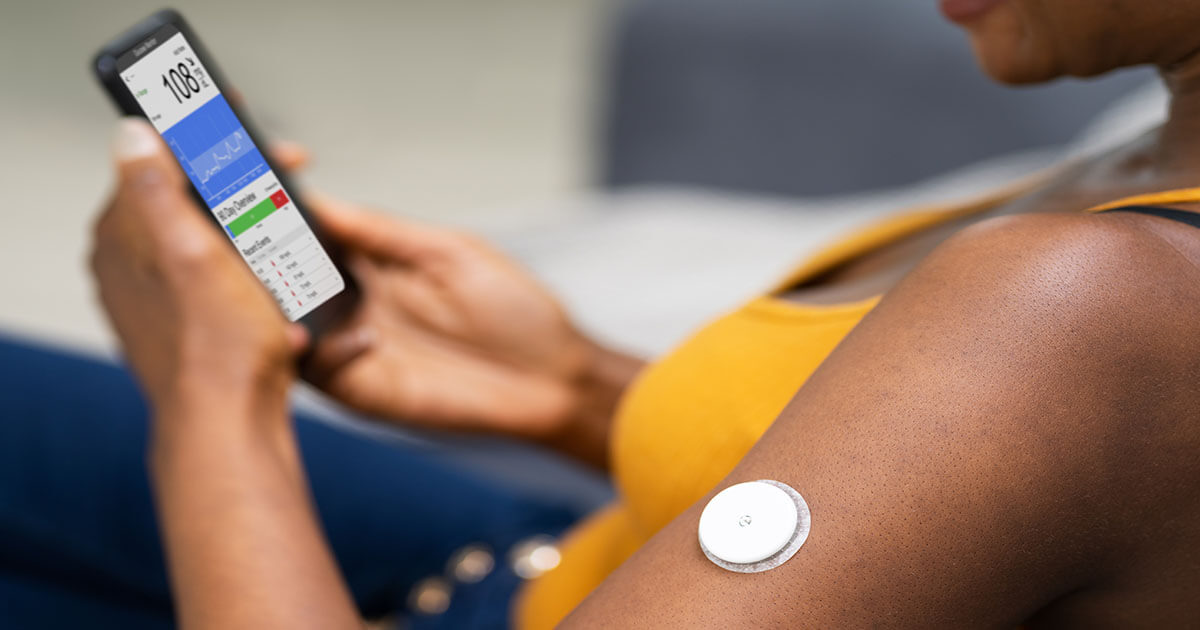As a diabetes specialist nurse (DSN) now working in higher education, the first question I ask myself regarding teaching and learning is: “What can I do to help healthcare professionals give their very best to every person with diabetes, at every contact, and how can this drive diabetes practice forward?” It is this essential link between transformative, reflective learning and improving practice that makes teaching healthcare professionals so valuable and it is this personal philosophy that has informed my approach to teaching.
I have always been interested in education. Even early on in my clinical role as a DSN, I designed and facilitated study days for university modules on diabetes care. I was also a mentor for people taking this course. This interest encouraged me to undertake a part-time MSc in Health Professional Education, which then led to my first education post as a Lecturer/Practitioner and finally to my current position as a Senior Lecturer in Diabetes Care at the University of York.
Through the various opportunities afforded to me, and by reflecting on my own experiences as a “learner”, I have been able to develop my professional acumen in teaching, learning and scholarship activities. I have been able to appraise the impact of my teaching and learning on others, including students, teaching colleagues and clinical colleagues, and to really make a difference through diabetes education.
My teaching approach is to stimulate “learner engagement” in order to build “learner enablement”. This provides the basis for the learner to reflect on their professional practice in diabetes care (Gardner, 2014).
This philosophy has led to the development of an extensive vanguard diabetes education portfolio alongside my colleagues, which has not only produced enthusiastic learners, but has also led to innovative educational approaches and practice-changing initiatives within the university, which have been adopted regionally, nationally and internationally. Recognition of this approach resulted in the prestigious Quality in Care National Outstanding Educator in Diabetes Award in 2014 (Figure 1). I was delighted to receive the following feedback:
“With a strong philosophy of collaborative teamwork and patient-centred care, Anne has a proven track record both as a DSN and as an outstanding diabetes educator. Fundamentally, Anne’s drive and passion ensures clinical practice influences the development of clinically relevant academic modules, and also that evidence and theory can influence practice and act as a prompt catalyst for change. Anne has written a plethora of clinically-focused articles, edited a book “Principles of Diabetes Care”, as well as being an editorial board member for several journals and a conference organiser.”
Making education count
As time is valuable for healthcare professionals, I am very conscious about making each educational encounter count. My approach to planning and delivering educational sessions is to consider each session not only as an opportunity to inform learners about aspects of diabetes, but also to clear misted vision and/or preconceived ideas; in other words, to drive the learners to question their own experience. Initiating reflective habits to develop both learners’ knowledge acquisition and their practice enhancement is essential to develop professional practitioners (Chambers et al, 2013; Gardner, 2014). Practice/learning and learning/practice development grow consequentially and are core to this approach (Quinn and Hughes, 2007).
An example of practice-changing education
An example of a module where such an approach has made a real difference to diabetes care delivery is the award-winning Children and Young Person’s Diabetes Care module (University of York). This module was also awarded the 2013 Quality in Care Diabetes Award for Best Improvement Programme for Children and Young People.
The module (level 6 and level 7) is delivered in collaboration with clinical colleagues from across the UK who are the leading experts in diabetes care. Carole Gelder, Children’s Diabetes Nurse at Leeds Children’s Hospital and Lecturer Practitioner at The University of York, and Dr Fiona Campbell, Consultant Paediatric Diabetologist at Leeds Children’s Hospital and Clinical Lead, Children and Maternity Strategic Clinical Network (Yorkshire & Humber) have been integral to the success of this module.
The learners, from a broad background and range of expertise, are taught in three intensive teaching blocks over six months. This professional group face restricted study leave opportunities, stressful clinical working environments and pressure to meet greater expectations in practice due to changing governmental directives (Department of Health, 2013). Furthermore, there is an unrelenting increase in the prevalence of children and young people being diagnosed with diabetes (Royal College of Paediatrics and Child Health, 2014). In order to augment learning shared during the intensive teaching blocks and to encourage reflection on practice, we encourage the learners to keep reflective diaries. Based on Gardner’s model (2014), reflection engages learners in deeper thinking to connect concepts and consider how this affects actions. Reflection can also highlight how emotions can influence practice delivery. I find this work particularly gratifying and feedback from students reflects this:
“Thank you, this has been a very interesting and exciting programme. It has made me want to go back to practice and change the world! The support we have been given is exemplary and the education is absolutely cutting edge – just a brilliant educational experience, probably the best of my professional career!”
Making meaningful links between theoretical learning and healthcare practice is also core to my approach. To reinforce this, I actively use problem-based case studies and case history work (Chambers et al, 2013). Learners appreciate this method of enquiry and clinical discovery as it arouses curiosity, builds confidence and allows conceptualisation of new approaches to their clinical practice.
Relevant assessment design
To ensure that learners relate their learning back to their practice, I strive to introduce a variety of clinically relevant assessment techniques. For example, in the Children and Young Person’s Diabetes Care module, the level 7 assessment includes writing a business case that aims to develop and/or enhance an area of care that the learner believes requires funding. Examples given at a recent assessment include a travelling diabetes education bus to reach hard-to-reach communities in a northern city and an initiative that established the translation of diabetes educative materials for asylum seekers.
The success of student-driven projects reinforces the value of providing practice-changing assessment opportunities, as they really embrace the learner’s interest and investment. As a result, learners can clearly see a practice outcome that is mutually beneficial to their individual learning and also their diabetes practice. I have also found it useful to use assessments to challenge learners’ beliefs about their capabilities, build their confidence and increase their engagement with the larger world of diabetes care.
Promotion and enhancement of teaching and learning
Writing for publication can influence practice substantially as it often involves nationwide readership. This is another important technique to teach and communicate education to wider audiences. These diabetes education articles can influence knowledge and practice delivery.
Through my editorial roles in the long-running diabetes education series in Practice Nursing and the Diabetes Care for Children & Young People journal, I have learnt how far-reaching written education can be, and I have encouraged colleagues and learners to publish their work. Helping a colleague or student to realise their potential in being published has given me great satisfaction and has proven to be beneficial for colleagues wanting to develop their careers.
Development through defining learning
One of my recent professional roles has been as an educational representative for the expert national writing group for the UK Competencies in Diabetes Nursing, 3rd edition (TREND-UK, 2013). Taking part in the design and creation of this competency framework has been a very powerful learning experience. Defining each competency, and the different levels within each of the competencies, was a challenge and gave me the opportunity to consider the multiple layers of knowledge, skills, attitudes and standards that learners need to absorb in order to understand what we expect of them, and what they are striving to achieve. Subsequently, this has helped me to highlight key learning more explicitly to my students.
In addition, my own professional learning has benefited from a partnership with a Japanese Diabetes Team in Takamatsu, led by Dr Yukio Tomioka. Dr Tomioka spent a year working with us in York and together we created a Japanese career framework for nurses in diabetes care based on the ethos of the UK competency framework. The first DSN post was established in Japan in 2009 and now there are DSNs employed in each of the 47 prefectures across Japan. This cross-cultural experience has been fascinating for me, as it has highlighted the commonality of purpose and need for all nurses, wherever they may practice. I have learnt a great deal from this experience and appreciate the harmony of purpose in diabetes education. Dr Tomioka’s diabetes team were able to celebrate my 2014 Quality in Care Award for Outstanding Educator in Diabetes (Figure 2).
Conclusion
In recent years, I have been at the forefront of diabetes education and have aimed to use different pedagogical methods to improve diabetes practice. Reflecting on my experience, I have been driven by my firm belief in using education to improve care for everyone with diabetes, wherever and whenever they access care. I am grateful that, due to the national recognition of my approach to diabetes education, I have been invited to be an educational representative in several national committees related to patient care and diabetes practice development. The initiatives are catalysts for practice change and ground-breaking, life-long education and I am delighted to be a part of them.





NHSEI National Clinical Lead for Diabetes in Children and Young People, Fulya Mehta, outlines the areas of focus for improving paediatric diabetes care.
16 Nov 2022